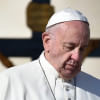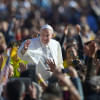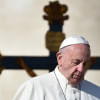Tributes pour in as Pope Francis dies

Pope Francis died yesterday, aged 88, prompting mourning across the world for the energetic reformer who inspired devotion from Catholics but riled traditionalists during a 12-year papacy.
Mourners gathered, many in tears, in St Peter's Square, where just a day earlier the frail-looking pontiff had greeted worshippers on Easter Sunday, having recently left hospital following a 38-day battle with double pneumonia.
World leaders paid tribute to Francis' moral and spiritual leadership, and countries began preparations to mark his death, which will now set off a succession scramble among Cardinals to see who next will lead the world's 1.4 billion Catholics.
"Dearest brothers and sisters, it is with deep sorrow that I must announce the death of our Holy Father Francis," said Cardinal Kevin Farrell in a Vatican statement.
"This morning at 7:35am (0535 GMT) the Bishop of Rome, Francis, returned to the home of the Father.
"His entire life was dedicated to the service of the Lord and His church," said the statement, released shortly before 10:00am.
His death sets in motion centuries-old traditions that will culminate in the gathering of a conclave of cardinals to choose a successor.
In the next four to six days, the Vatican's cardinals will decide on the pope's funeral date, which must take place between four and six days after his death.
In the meantime, the day-to-day running of the tiny Vatican City state will be handled by the Camerlengo, a senior cardinal, who is currently Dublin-born Cardinal Farrell.
Francis died in his apartment at the Saint Martha residence, where he had lived since his election in March 2013, the Vatican said.
The cause of his death would "probably" be shared after Francis's body is laid in its coffin in the Saint Martha chapel at 8:00pm (1800 GMT), the Vatican said.
Just before that, a public Rosary prayer was to be held in St Peter's Square, the Vatican said, adding that Francis's body would likely be transferred to St Peter's Basilica tomorrow to lie in state.
Francis, born in Argentina as Jorge Bergoglio, was the first Jesuit to lead the Catholic world and the first from the Americas.
He took over after Benedict XVI became the first pontiff since the Middle Ages to step down -- and cut a sharply different figure from the German theologian.
A football-loving former archbishop of Buenos Aires who was often happiest among his flock, Francis sought to forge a more open and compassionate Church.
World leaders praised him for having strongly defended social justice and the rights of migrants.
King Charles, who met Francis during a state visit earlier this month, said the pope had "served with such devotion".
Italy's Prime Minister Giorgia Meloni said "a great man has left us" in a statement.
Argentina's President Javier Milei pointed to his compatriot's "goodness and wisdom" despite their "differences".
European Commission President Ursula von der Leyen said Francis had "inspired millions... with his humility and love so pure for the less fortunate".
US President Donald Trump wrote "Rest in Peace" on his Truth Social platform, and his predecessor Joe Biden, a Catholic, hailed "one of the most consequential leaders of our time" on X.
Chief Adviser Professor Muhammad Yunus has expressed his deepest condolences at the demise of Pope Francis.
"On behalf of the Government and the people of Bangladesh, we, with a heavy heart, express our deepest condolences at the sad demise of His Holiness Pope Francis, a beacon of peace, humanity, and unity," he said in a letter addressed to Cardinal Pietro Parolin, secretary of state of the Holy See Vatican City.
BNP acting chairman Tarique Rahman also expressed his profound sorrow and condolences at the passing of the Pope.
Spain declared three days of mourning, with Argentina announcing a full week.
The bells at Notre Dame Cathedral in Paris rang out 88 times and the city said the lights would be turned off at the Eiffel Tower in the evening.
Francis's pontificate was also marked by pushing through governance reforms and tackling the scourge of clerical sex abuse of children.
But critics accused him of creating doctrinal confusion and failing to defend traditional Catholic beliefs on key issues such as abortion and divorce.
Francis's desire to chart a different path was evident right to the end, with his decision to be buried not in St Peter's Basilica but in Rome's Santa Maria Maggiore basilica.
He will become the first pope in more than 100 years to be laid to rest outside the Vatican.
Francis also rejected the tradition of popes having three coffins, choosing instead to be buried in just one.
When Francis took over, the Catholic Church was mired in infighting and beset by a global scandal over clerical sex abuse of children and decades of cover-ups.
He promised an end to impunity and changed Vatican law to help tackle abuse, though victims said he could have gone further.
He also initiated a major shake-up of the Vatican's powerful governing body that included improving financial responsibility and allowing lay Catholics to lead Vatican offices.
Throughout his papacy, Francis championed the poor and vulnerable and emphasised love over doctrine.

 For all latest news, follow The Daily Star's Google News channel.
For all latest news, follow The Daily Star's Google News channel. 








Comments